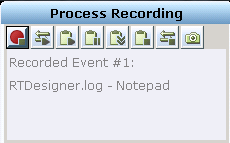Process Recording Toolbar
The Process Recording toolbar, shown below, is used to control the recording process and to mark events with the applicable trigger type in the Recording pane.
The Process Recorder is used to streamline the process creation in the Real-Time Designer. Not only can the user record a process based on application monitoring, but the user can also record a process based on both application monitoring and Screen Connectivity. This enriches the process and allows the user to add complexity and resolution to a process via the simple interface of the Process Recorder.
For further details on the Recording pane, see Recording Pane.

The Process Recording toolbar contains the following tools:
|
|
Stop Recording |
Stops the recording process. This action closes the toolbar and returns to Real-Time Designer. |
|
|
Process Start |
Enters Process Start in the Trigger Type field for the selected event. |
|
|
Task Start |
Enters Task Start in the Trigger Type field for the selected event. |
|
|
Task Pause |
Enters Task Pause in the Trigger Type field for the selected event. |
|
|
Task Resume |
Enters Task Resume in the Trigger Type field for the selected event. |
|
|
Task Stop |
Enters Task Stop in the Trigger Type field for the selected event. |
|
|
Process Stop |
Enters Process Stop in the Trigger Type field for the selected event. |
|
|
Screen Element |
Enters Screen Element in the Trigger Type field for the selected event. This tool captures a screen element. It marks the element in a third party application and retains it’s properties. After successful capture, the Screen Element is included as an item in the Physical Objects tab. For further capture details, and for further Screen Element details, see Real-Time Solutions Designer User Guide.
|








